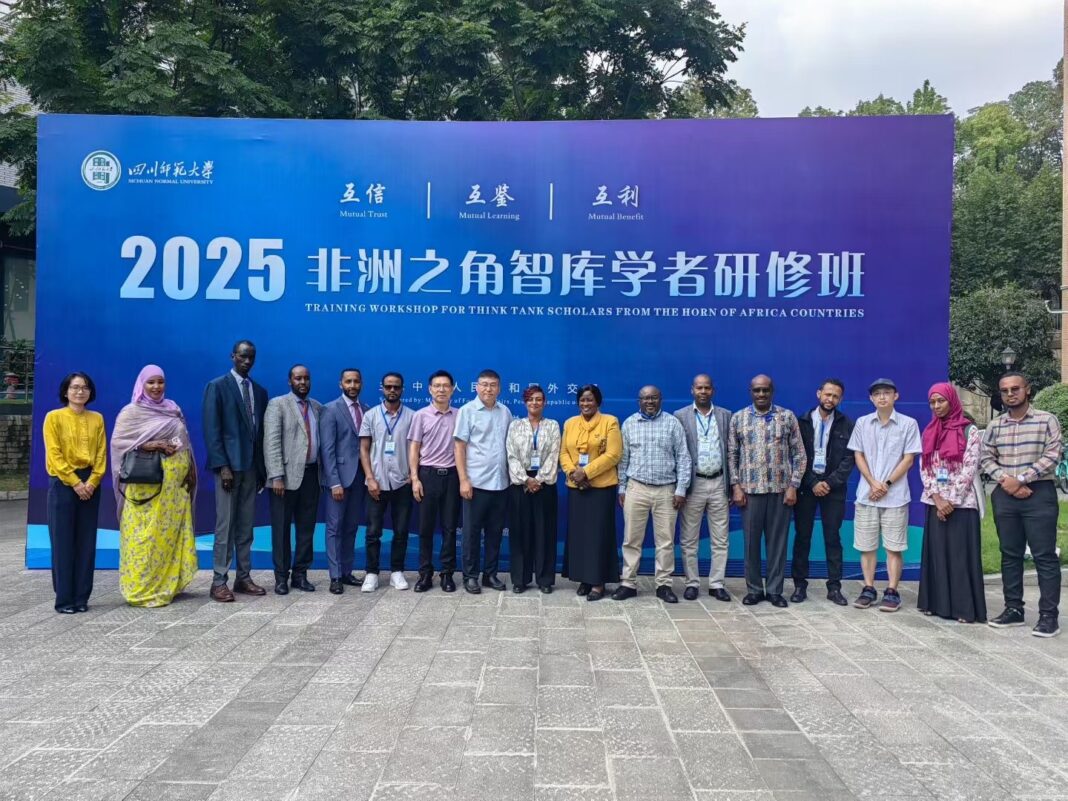On the morning of September 18, Sichuan Normal University (SCNU) in Chengdu, China, hosted the Opening Ceremony of the 2025 Training Workshop for Think-Tank Scholars from the Horn of Africa countries. This significant event saw participation from high-level Chinese officials, university leadership, academic experts, and representatives of the invited scholars from eight Horn of Africa nations.
Distinguished guests at the ceremony included Xu Zhongsheng, Counselor of the Department of African Affairs, Ministry of Foreign Affairs of China; Feng Qinghu, Counselor of the Department of Security Cooperation; Yang Jiemian, Member of the Foreign Policy Advisory Committee and Chairman of the Academic Committee of the Shanghai Institutes for International Studies (SIIS); and Xu Dongcheng, a Level-3 Investigator from the Department of African Affairs. Professor Zhao Guohua, President of Sichuan Normal University, and Professor Zhang Haidong, Deputy Secretary of the Communist Party University Committee, were also present, alongside heads of relevant university departments.
The ceremony was chaired by Professor Lyu Jing, Executive Class Advisor of the Training Workshop and Executive President of the Academy of Global Governance and Area Studies at SCNU, setting the tone for a program keenly focused on fostering collaboration and mutual learning.
Prior to the ceremony, a meeting was held where Mr. Guo Yong, Secretary of the CPC University Committee, engaged with the visiting Ministry of Foreign Affairs leaders and representatives of the training team.
The event opened with an enchanting musical medley by students from SCNU’s College of International Chinese Education, featuring pieces such as “Prelude to Water Melody,” “Blue and White Porcelain,” and “Chinese Language,” warmly welcoming all distinguished participants.
In his welcome address, Professor Zhao Guohua highlighted SCNU’s commitment to deepening educational and research cooperation with African countries. He highlighted the establishment of the Confucius Institute in Djibouti in 2022 and the founding of the Djibouti Research Center in 2024 as key milestones. Emphasizing the vision of building a “Community with a Shared Future for Mankind,” he outlined plans to expand practical cooperation with African nations, especially those in the Horn of Africa, in fields including think tank development, education, science and technology, and cultural exchange. Professor Zhao encouraged the scholars to engage passionately in dialogue, advance the outcomes of the Forum on China–Africa Cooperation (FOCAC) Beijing Summit, deepen their understanding of China’s modernization path, and contribute meaningfully to peace and development in the Horn of Africa region.
Speaking on behalf of the workshop sponsor, China’s Ministry of Foreign Affairs, Xu Zhongsheng expressed appreciation for SCNU’s robust support and lauded the workshop’s meticulously planned curriculum and diverse training methodologies. He underscored the unique opportunity for trainees to witness China’s successes in ethnic integration, poverty alleviation, modernization, and technological advancement. Xu affirmed that this would foster greater mutual understanding and friendship between China and Africa, furthering collaboration in security, governance, and development, and building a stronger China–Africa community with shared destiny.
Addressing security cooperation, Feng Qinghu tied the workshop to the broader context of China’s global peace initiatives, highlighting the Shanghai Cooperation Organization (SCO) Summit earlier in 2025 where General Secretary Xi Jinping introduced the Global Governance Initiative. Feng noted the workshop’s role as a tangible step in implementing this initiative, strengthening China–Africa ties, expanding China’s international partnerships, and promoting mutual understanding.
Yang Jiemian, representing the trainers, spoke passionately about the historical and cultural richness shared by China and Africa. He emphasized the importance of exchanging governance experiences beyond Western frameworks and encouraged constructive cooperation to advance common development goals for a better future.
Representing the trainees, Simon Mulongo, former Special Envoy of the African Union and parliamentary committee vice-chair from Uganda, thanked China for its steadfast partnership with Africa. Highlighting China’s contributions in security, governance, and economic development, he expressed the collective commitment of the scholars to maximize the training opportunity and deepen their insights into Chinese experiences.
Professor Zhang Haidong honored the trainees by presenting them with the English edition of “Xi Jinping: The Governance of China (Volume V),” symbolizing the knowledge exchange central to the workshop’s objectives.
The 2025 Training Workshop, sponsored by China’s Ministry of Foreign Affairs and organized by SCNU with co-organization by the Foreign Affairs Office of the Xinjiang Uygur Autonomous Region, adopts the theme of “Mutual Trust, Mutual Learning, and Mutual Benefit.”
The selected trainees hail from eight countries—Ethiopia, Somalia, Eritrea, Djibouti, Sudan, South Sudan, Kenya, and Uganda. Following a rigorous selection process by Chinese embassies, two representatives from each country (except Eritrea, which sent one) participate. These scholars hold influential positions within government ministries, think tanks, academic institutions, and media organizations in their home countries, playing active roles in advancing regional cooperation and development.
Over ten days, participants will engage in intensive theoretical sessions and practical activities. Curricula cover topics including “Xi Jinping Thought on Diplomacy,” “Chinese Traditional Culture,” “Technological and Agricultural Modernization,” “Urban Development and Social Governance,” and the “Chinese Path to Modernization.” Lecturers from top Chinese universities and research centers will guide the scholars, supplemented by field visits and exchanges in Chengdu and Urumqi, Xinjiang, to provide a hands-on understanding of China’s governance models and development achievements.
This groundbreaking training represents a vital knowledge transfer platform, strengthening cooperation between China and the Horn of Africa in areas critical for sustainable development, regional stability, and governance innovation. The workshop demonstrates China’s commitment to fostering collaboration with Africa grounded in mutual respect and shared aspirations for peace and prosperity.
As these think-tank scholars return to their countries equipped with new ideas and expertise, the program bolsters the capacity of Africa’s intellectual leadership and contributes to crafting effective policies aligned with local realities and shared global challenges.
The 2025 Training Workshop at Sichuan Normal University stands as a beacon of the enduring China-Africa partnership, signaling a future of deeper integration and common advancement for the Horn of Africa and beyond.







